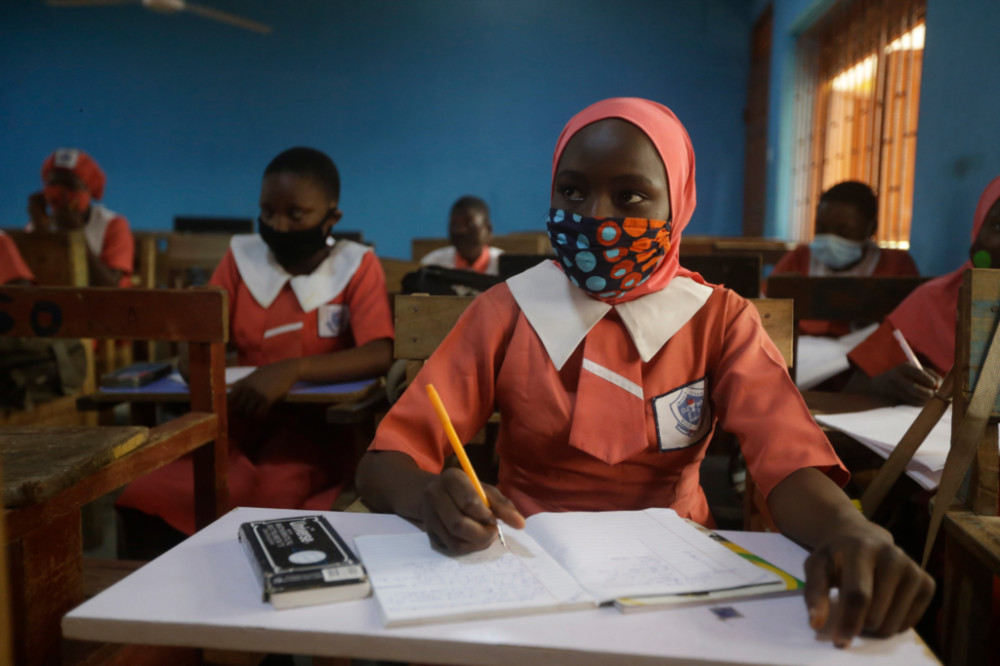Nairobi, Kenya
RNS
In its traditional form, religious veils worn by Muslim women signify modesty and privacy. Fashions range from simple scarves known as “khimaars” to head-to-toe cloaks known as abayas or burqas.
But in any form, wearing hijab is regarded as an act of worship or a statement of Muslim faith, and recently, the religious garments have triggered bitter fights between Christians and Muslims. One such fight is unfolding in the western Nigerian state of Kwara, forcing a temporary closure of at least 10 Christian schools.

Students from Oregun Junior and Senior High School, wearing face mask to protect against coronavirus attend lectures inside a class room in Lagos Nigeria, on Monday, 18th January, 2021. PICTURE: AP Photo/Sunday Alamba/File photo.
The dispute began in February, when the head of the schools sent Muslim students with head coverings away, in apparent violation of Nigeria’s constitutional right to wear a head covering. The school official claimed that veils were against the original Christian heritage of the school’s founding missionaries.
“We assert that in principle and practice our schools are mission [government] grant-aided schools and not general public schools and cannot be technically Islamized starting with the use of Hijab,” said Rev Reuben Idowu Ibitoye, a Baptist minister who is the secretary-general of the Christian Association of Nigeria in Kwara, in a statement.
Earlier in the month, the state government approved the use of the hijab in school, but the Christian association said it rejected and condemned the approval.
“This will cause discrimination in schools and also allow terrorists to easily identify our children and ward,” said Ibitoye, while also calling for the government to return mission school oversight to churches.
But Nigeria’s hijab dispute is similar to those in some other African countries.
In 2015, the countries of Congo, with a population that is 1.3 per cent Muslim; Chad, with 51 per cent; Guinea, with 85 per cent; and Cameroon, with about 30 per cent, banned modesty garments to counter Boko Haram, the Nigerian terrorist group that is increasingly active in the region. The bans were part of the measure to curb terrorist activities. Tunisia, Gabon and Morocco are African countries with large populations of Muslims that have banned the burqa.
In East Africa, similar disputes have also occurred. In Kenya in 2019, the supreme court overturned a lower court ruling that had allowed female students to wear the head coverings in school. The ruling was decided as Muslim leaders made a spirited push for allowing religious garments in church-owned schools.
Christian leaders and educators had been resisting the move, maintaining that dress codes and school uniforms not only provided discipline and equality, but also were part of church and school traditions.
“We have been successful in most of the schools, but there are others where we had to allow the hijab due to the large numbers of Muslim students. We are still pushing to maintain the Catholic Church traditions, ethos and values in the schools we sponsor,” said Rev Henry Ndune, a Roman Catholic priest in the Archdiocese of Mombasa, a region with many Muslims.
In Uganda, the controversy around the hijab in schools is bigger than in Nigeria, said Hadija Kibira, the chairperson of the Uganda Muslim Women Vision.
“The biggest problem is in public schools. Many of them have been Christianised and therefore do not allow the wearing of the hijab,” Kibira told Religion News Service. “They admit very few Muslims, who usually have less say and cannot demand their rights.”
According to Kibira, students sitting for national examinations are often stripped of their hijab in accordance with a ban by the examination board, and some at Uganda’s main university in Makerere have been stopped from sitting for their examinations altogether.
“In Uganda, Muslim women are not allowed to have hijab in their passport photographs. At the airport, many times, we have been told to unveil for identification with the photo on the Passport,” said Kibira, adding that her organisation has petitioned the court and the parliament over hijab on the passport.
Abdallah Kheri, a Muslim religious scholar who chairs the Islamic Research and Education Trust in Kenya, said the disagreements are caused by the faiths’ failure to reason and dialogue.
“Historically the two faiths have been rivals, since they are calling people to join. They are always looking for customers, and they shall forever be rivals, but they have to reason and co-exist,” said Kheri, who said colonization exacerbated these divisions.
“In Nigeria, some of the disputes trigger because Christians and Muslims cannot agree on who is the majority. In Kenya, the problems are due to lack of knowledge and growing religious extremism,” he said.






